презентация история литературы.pptx
- Количество слайдов: 9
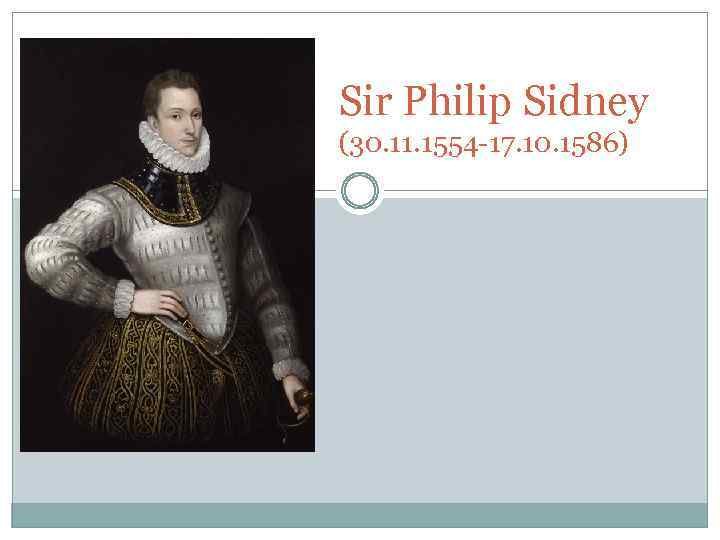 Sir Philip Sidney (30. 11. 1554 -17. 10. 1586)
Sir Philip Sidney (30. 11. 1554 -17. 10. 1586)
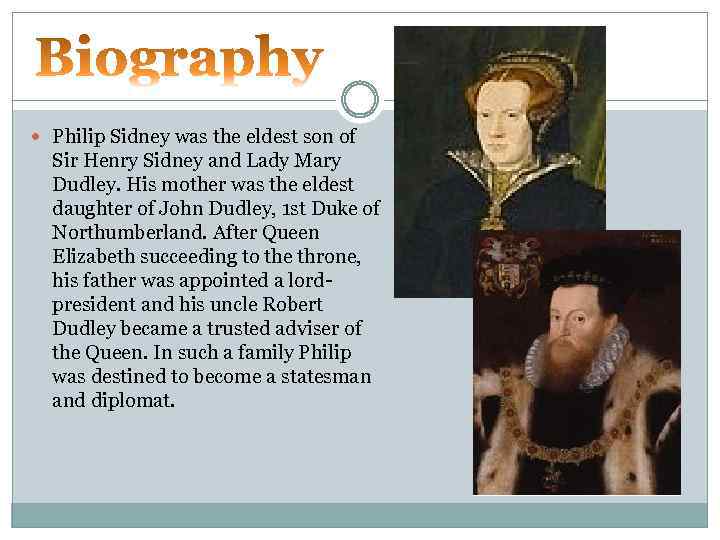 Philip Sidney was the eldest son of Sir Henry Sidney and Lady Mary Dudley. His mother was the eldest daughter of John Dudley, 1 st Duke of Northumberland. After Queen Elizabeth succeeding to the throne, his father was appointed a lordpresident and his uncle Robert Dudley became a trusted adviser of the Queen. In such a family Philip was destined to become a statesman and diplomat.
Philip Sidney was the eldest son of Sir Henry Sidney and Lady Mary Dudley. His mother was the eldest daughter of John Dudley, 1 st Duke of Northumberland. After Queen Elizabeth succeeding to the throne, his father was appointed a lordpresident and his uncle Robert Dudley became a trusted adviser of the Queen. In such a family Philip was destined to become a statesman and diplomat.
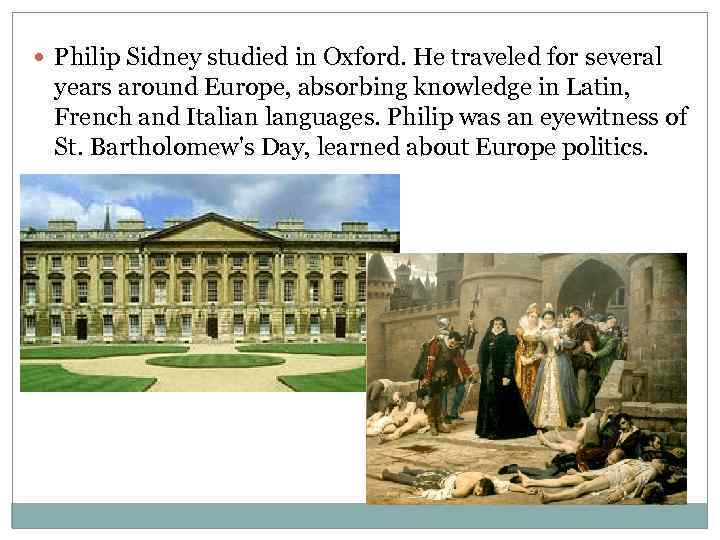 Philip Sidney studied in Oxford. He traveled for several years around Europe, absorbing knowledge in Latin, French and Italian languages. Philip was an eyewitness of St. Bartholomew's Day, learned about Europe politics.
Philip Sidney studied in Oxford. He traveled for several years around Europe, absorbing knowledge in Latin, French and Italian languages. Philip was an eyewitness of St. Bartholomew's Day, learned about Europe politics.
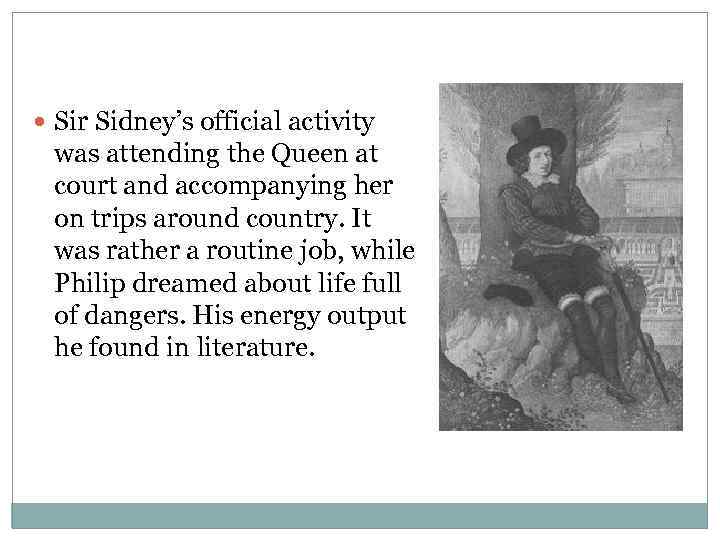 Sir Sidney’s official activity was attending the Queen at court and accompanying her on trips around country. It was rather a routine job, while Philip dreamed about life full of dangers. His energy output he found in literature.
Sir Sidney’s official activity was attending the Queen at court and accompanying her on trips around country. It was rather a routine job, while Philip dreamed about life full of dangers. His energy output he found in literature.
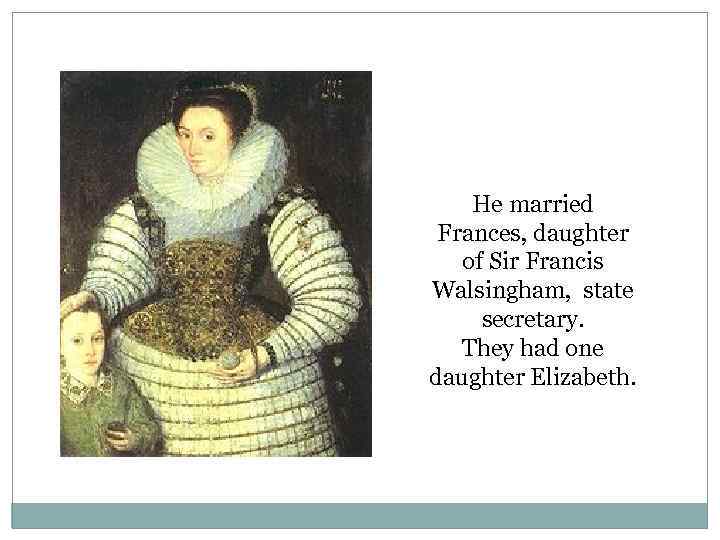 He married Frances, daughter of Sir Francis Walsingham, state secretary. They had one daughter Elizabeth.
He married Frances, daughter of Sir Francis Walsingham, state secretary. They had one daughter Elizabeth.
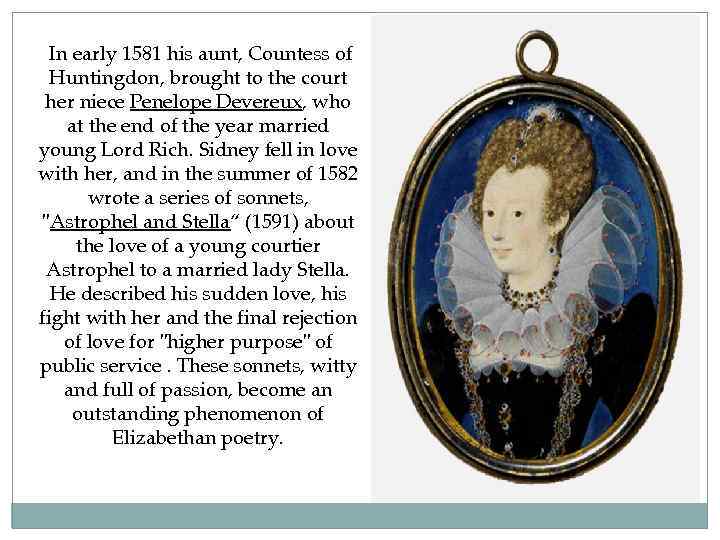 In early 1581 his aunt, Countess of Huntingdon, brought to the court her niece Penelope Devereux, who at the end of the year married young Lord Rich. Sidney fell in love with her, and in the summer of 1582 wrote a series of sonnets, "Astrophel and Stella“ (1591) about the love of a young courtier Astrophel to a married lady Stella. He described his sudden love, his fight with her and the final rejection of love for "higher purpose" of public service. These sonnets, witty and full of passion, become an outstanding phenomenon of Elizabethan poetry.
In early 1581 his aunt, Countess of Huntingdon, brought to the court her niece Penelope Devereux, who at the end of the year married young Lord Rich. Sidney fell in love with her, and in the summer of 1582 wrote a series of sonnets, "Astrophel and Stella“ (1591) about the love of a young courtier Astrophel to a married lady Stella. He described his sudden love, his fight with her and the final rejection of love for "higher purpose" of public service. These sonnets, witty and full of passion, become an outstanding phenomenon of Elizabethan poetry.
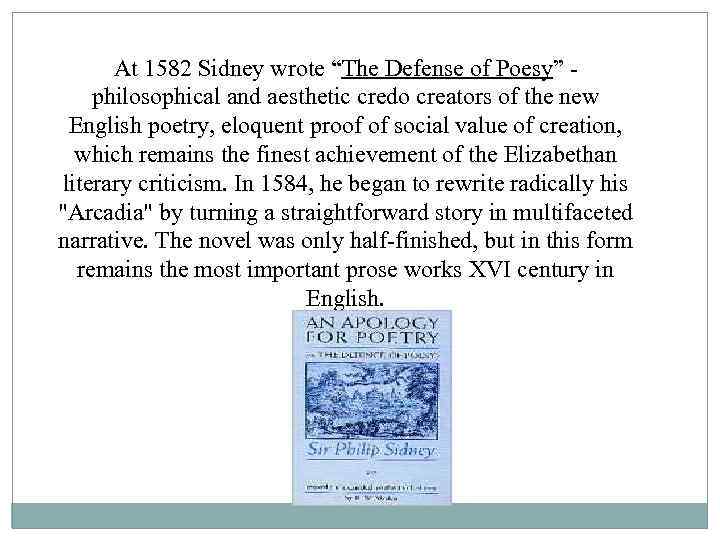 At 1582 Sidney wrote “The Defense of Poesy” philosophical and aesthetic credo creators of the new English poetry, eloquent proof of social value of creation, which remains the finest achievement of the Elizabethan literary criticism. In 1584, he began to rewrite radically his "Arcadia" by turning a straightforward story in multifaceted narrative. The novel was only half-finished, but in this form remains the most important prose works XVI century in English.
At 1582 Sidney wrote “The Defense of Poesy” philosophical and aesthetic credo creators of the new English poetry, eloquent proof of social value of creation, which remains the finest achievement of the Elizabethan literary criticism. In 1584, he began to rewrite radically his "Arcadia" by turning a straightforward story in multifaceted narrative. The novel was only half-finished, but in this form remains the most important prose works XVI century in English.
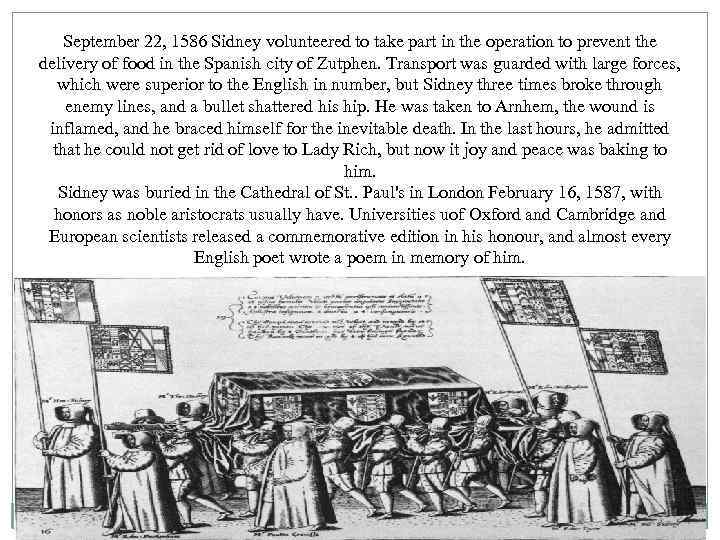 September 22, 1586 Sidney volunteered to take part in the operation to prevent the delivery of food in the Spanish city of Zutphen. Transport was guarded with large forces, which were superior to the English in number, but Sidney three times broke through enemy lines, and a bullet shattered his hip. He was taken to Arnhem, the wound is inflamed, and he braced himself for the inevitable death. In the last hours, he admitted that he could not get rid of love to Lady Rich, but now it joy and peace was baking to him. Sidney was buried in the Cathedral of St. . Paul's in London February 16, 1587, with honors as noble aristocrats usually have. Universities uof Oxford and Cambridge and European scientists released a commemorative edition in his honour, and almost every English poet wrote a poem in memory of him.
September 22, 1586 Sidney volunteered to take part in the operation to prevent the delivery of food in the Spanish city of Zutphen. Transport was guarded with large forces, which were superior to the English in number, but Sidney three times broke through enemy lines, and a bullet shattered his hip. He was taken to Arnhem, the wound is inflamed, and he braced himself for the inevitable death. In the last hours, he admitted that he could not get rid of love to Lady Rich, but now it joy and peace was baking to him. Sidney was buried in the Cathedral of St. . Paul's in London February 16, 1587, with honors as noble aristocrats usually have. Universities uof Oxford and Cambridge and European scientists released a commemorative edition in his honour, and almost every English poet wrote a poem in memory of him.
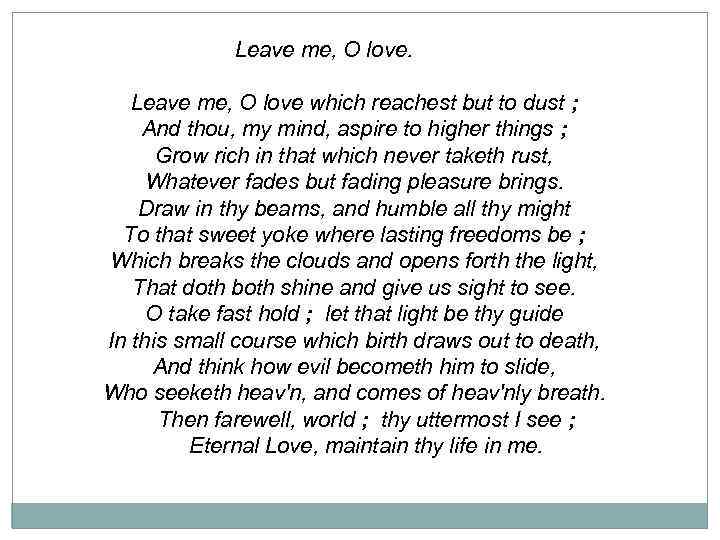 Leave me, O love. Leave me, O love which reachest but to dust ; And thou, my mind, aspire to higher things ; Grow rich in that which never taketh rust, Whatever fades but fading pleasure brings. Draw in thy beams, and humble all thy might To that sweet yoke where lasting freedoms be ; Which breaks the clouds and opens forth the light, That doth both shine and give us sight to see. O take fast hold ; let that light be thy guide In this small course which birth draws out to death, And think how evil becometh him to slide, Who seeketh heav'n, and comes of heav'nly breath. Then farewell, world ; thy uttermost I see ; Eternal Love, maintain thy life in me.
Leave me, O love. Leave me, O love which reachest but to dust ; And thou, my mind, aspire to higher things ; Grow rich in that which never taketh rust, Whatever fades but fading pleasure brings. Draw in thy beams, and humble all thy might To that sweet yoke where lasting freedoms be ; Which breaks the clouds and opens forth the light, That doth both shine and give us sight to see. O take fast hold ; let that light be thy guide In this small course which birth draws out to death, And think how evil becometh him to slide, Who seeketh heav'n, and comes of heav'nly breath. Then farewell, world ; thy uttermost I see ; Eternal Love, maintain thy life in me.
